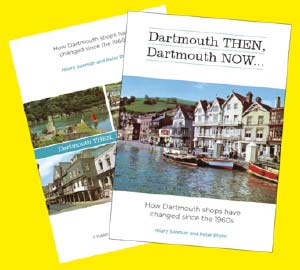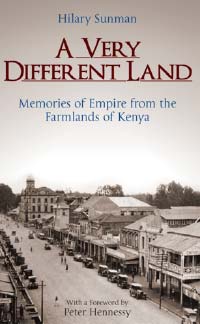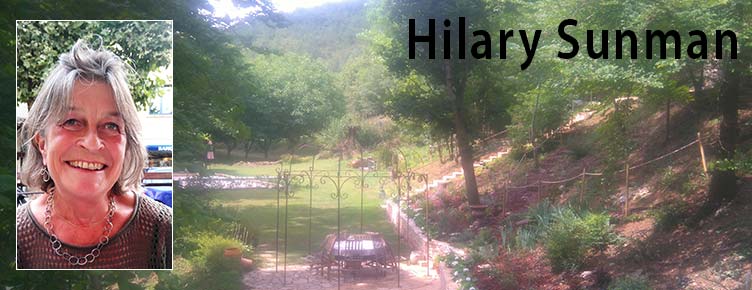 My recent writing Dartmouth then – Dartmouth now was published by the Dartmouth History Research Group.
My recent writing Dartmouth then – Dartmouth now was published by the Dartmouth History Research Group.
The book shows how Dartmouth has transformed itself over fifty years from a small self contained town based on fishing and maritime services into a tourist hub with art galleries, restaurants, a marina – none of which existed in the mid 1960s.
Available by emailing Dartmouth Community Bookshop - price £4 plus P & P
Dartmouth then – Dartmouth now
How Dartmouth shops have changed since the 1960s
In the mid 1960s, Dartmouth was a small self contained town, based on fishing and maritime trade with a few tourist boats and the Britannia Royal Naval College. Fifty years later, the fishing has all but gone, the number of tourist boats has exploded and there is still the college. There are also two supermarkets, sixteen art galleries, and only one butcher and one green grocer.
This study compared the number and types of shops and businesses like restaurants and bakeries in the mid 1960s with today – fifty years on – and finds that while there are many changes on the surface, the overall number of shops is roughly the same, about 400, although more of them are concerned with leisure – the clothes shops, the gift shops – the heart of the town is as robust as ever. In this booklet the authors take the reader along the main shopping streets – Fairfax Place, the South Embankment, Duke Street and Foss Street - looking in considerable detail, shop by shop, at the changes since the 1960s. The study finds that Dartmouth has retained its sense of quiet self-sufficiency, and the authors reflect on how the town has retained its vitality. Dartmouth seems to have fared better than neighbouring towns such as Salcombe with nearly 40% of its homes empty in the winter, abandoned by second homers; or Totnes which for all its vibrant high street still has over 10 charity shops in the town centre.
The essence of Dartmouth has always been its relation with the sea and the river – from the earliest trading days to the modern day. And the authors conclude that the town continues to thrive because of this relationship – the river continues to be at the heart of Dartmouth life.
June 2016
Published by the Dartmouth History Research Group, available from the Dartmouth Museum, the Dartmouth Community Bookshop and the Tourist information Office, price £4.00
Writing
A Very Different Land
 My book, 'A Very Different Land' is an enriching memoir of late colonial Kenya and the legacies of the period. It gives a different perspective on Kenya before 1950, not the usual Happy Valley story but the serious commitment of civil servants of whom much was expected and much given. Based around my parents' lives there from 1928 to 1950, I explore some of the aspects of late Empire and the idealism of many of those who worked in the colonies to make the lives of the people they served better and to build a peaceable and prosperous world. I write about the sense of quest and mission of a generation of young colonial servants and their wives–like my parents - who embarked on a life's journey in Africa, a strong and respected career working within what was seen then as the family of Empire.
My book, 'A Very Different Land' is an enriching memoir of late colonial Kenya and the legacies of the period. It gives a different perspective on Kenya before 1950, not the usual Happy Valley story but the serious commitment of civil servants of whom much was expected and much given. Based around my parents' lives there from 1928 to 1950, I explore some of the aspects of late Empire and the idealism of many of those who worked in the colonies to make the lives of the people they served better and to build a peaceable and prosperous world. I write about the sense of quest and mission of a generation of young colonial servants and their wives–like my parents - who embarked on a life's journey in Africa, a strong and respected career working within what was seen then as the family of Empire.
This generation - setting out for the Colonies in the 1920s and 1930s – took all their possessions - the fabric of their lives – with them, to work in various countries and departments. In my father's case, this was the Department of Agriculture, working with African farmers to improve their livelihoods. They returned home with a sense of a life well lived but to find an England very different from the one they had left, one where the vision of Empire had withered, and where they and others like them would find it difficult to find a place. Yet the experiences of that generation left a lasting legacy – both expected and unexpected - in Kenya; and in the lives of the current generation, we children of Empire, and even today.
This is perhaps an unexpected view in a Britain still suffering from post Colonial guilt, but one of which Professor Peter Hennessy, writes; 'The richness, texture and careful sensitive recreations within these pages are a powerful & necessary antidote to those who come to Imperial history to sneer and smear.'
I have worked in Africa and other developing countries – outposts of the former empire – for most of my professional life. As a development economist, trained in the 1970s and 1980s I was convinced of the malign impacts of Empire on the former colonies. But over time I have come to see that the balance between the goods and bads of Empire is more nuanced. This book is written to explore this perspective; in the kind words of Professor Hennessy, it is ' a treat to read and absorb'.
A Very Different Land – published by IBTauris, 2014
To buy, click here.
